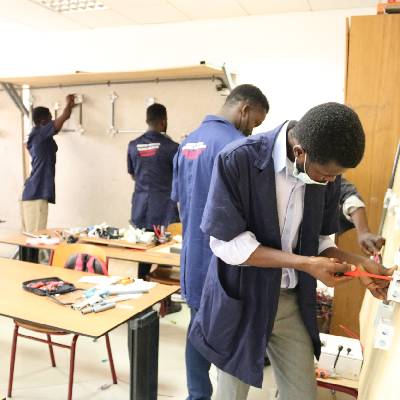
Career Opportunities
- horticulture science consultant
- orchard and greenhouse production management
- crop disease and pest control
- technology, innovation, and robotics
- post-harvest management
- biosecurity
- organic production
- perishable supply chain management
- international trade, access, and marketing
- policy, regulation, and advocacy.
Entry Requirements
To be eligible for admission into the Bachelor of Science (Horticulture) degree program you need to meet the following minimum admission requirements:
- Holders of KCSE with a mean grade of C+ with passes at C or above in Biology, Chemistry, Mathematics or Physics or Geography, and any one of the following; English, Kiswahili, Physics (if not included above), History and Government, Geography (if not included above), Christian Religious Education, Islamic Religious Education, Hindu Religious Education, Home Science, Art and Design, Agriculture, Aviation Technology, Computer Science, French, Germany, Arabic, Music, Business Studies.
- Holders of K.A.C.E. or equivalent with a minimum of 2 principal passes in Biology and Chemistry and at least a subsidiary pass in Mathematics. If Mathematics was not offered at K.A.C.E, then it is accepted at Ordinary Level but with a minimum of a credit pass.
- Holders of a Diploma in Biological Sciences or related sciences from a recognized institution with credit or distinction, with KCSE, mean grade of C or above.
- Holders of a degree in biological sciences or related sciences from a recognized University
Objectives of Bachelor of Science in Horticulture
The horticultural sector has acquired a bigger role in the economy of Kenya in generating self-employment and increasing income for the rural population. There is, therefore, a dire need for highly qualified manpower to provide the necessary skills to sustain and expand production for the local market, raw materials for the processing industry, and fresh exports.
The Bachelor of Science degree program in Horticulture is thus aimed at bringing about the realization of this potential. The broad objective of the program is to train high-level manpower with practical and theoretical skills in general horticulture who will, through research, extension, marketing, and self-employment, be able to improve and increase both the production of horticultural and other crops. At the end of the program the graduates should be able to:
- Perceive the importance of horticulture in the national economy with particular reference to the role of vegetables, fruits, and flowers in meeting the family needs for food, clothing, and shelter.
- Make use of the acquired knowledge and practical skills to raise production and improve the marketing of horticultural crops and products on both small and large-scale farms.
- Set up and run a thriving private horticultural enterprise on vegetables, fruits, or flowers.
- Using acquired knowledge and practical skills, be able to relate and integrate the production of horticultural crops with other farm enterprises.
- Carry out simple, but meaningful scientific research on various facets of horticultural and other crop enterprises.
- Promote environmental conservation by encouraging and effecting practices that minimize soil erosion and pollution from pesticides.
What you will study
The Bachelor of Science in Horticulture degree program normally takes four academic years, and the courses are offered in units. A course unit is defined as a 2-hour lecture and a 2-hour tutorial or a 3-hour practical session per week per semester. The professional nature of the program necessitates that in a given academic year the candidates will take a minimum of 16 units and a maximum of 18 units, exclusive of Field Attachment and Research Project. Students will take all the courses offered in each academic year.
Year 1 Units
- Communication Skills
- General Economics
- Introduction to General Agric. and Agrometeorology
- Mathematics I
- Physics I
- General Microbiology
- Chemistry I (Inorganic)
- Plant Morphology and Anatomy
- Development Studies
- Mathematics II
- Physics II
- Chemistry II (Physical)
- Chemistry III (Organic)
- Taxonomy of Higher Plants
- Entomology
- Animal Production
- HIV/AIDS
Year 2 Units
- Farm Records and Accounts
- Information Technology I
- Technical Drawing and Survey
- Statistics
- Plant Biochemistry and Physiology
- Plant Physiology
- Weed Science
- Soil Science I
- Farm Management
- Information Technology II
- Principles of Horticulture
- Plant Propagation
- Genetics and Cytogenetics
- Ornamental Horticulture I
- Annual and Perennial Crops
- Soil Science II
- Field Attachment I
Year 3 Units
- Agricultural Marketing
- Pomology I
- Olericulture I
- Plant Pathology
- Floriculture I
- Plant Nutrition
- Experimental Design
- Agricultural Structures I
- Pomology II
- Olericulture II
- Plant Breeding
- Floriculture II
- Postharvest Physiology
- Soil Fertility and Fertilizers
- Introduction to Farm Power and Machinery
- Research Project I
- Field Attachment II
Year 4 Units
- Ecology and Environmental Science
- Plant Biotechnology
- Crop Protection
- Postharvest Technology I (Perishables)
- Soil and Water Engineering
- Horticultural Seminar
- Research Project II (2 Units)
- Rural Sociology and Agricultural Extension
- Seed Science and Technology
- Ornamental Horticulture II
- Principles of Food Processing and Preservation
- Soil Survey, Classification, Land Evaluation and Planning
- Landscape Design and Management
- Research Project III (2 Units)
Related articles
-

A Guide to Civil Engineering Degree and Diploma Programs in Kenya
08-Nov-2025 -

Electrical Engineering in Kenya: A 2025 Guide for KCSE Graduates
08-Nov-2025 -

Mechanical Engineering in Kenya: A 2025 Guide for KCSE Graduates
08-Nov-2025 -

Engineering Courses in Kenya: A Guide for 2025 KCSE Graduates
08-Nov-2025 -

Education Pathways in Kenya — From Basic Education to Tertiary | College Guide
06-Nov-2025 -

The Bird and the Mirror: A Reflection on Identity, Perception, and Illusion
07-Feb-2025
Colleges offering Bachelor of Science in Horticulture

Starehe
University of Nairobi

Kisumu West
Maseno University

Kilifi South
Pwani University

Chuka Igambangombe
Chuka University

Kitui West
South Eastern Kenya University

Belgut
University of Kabianga

Runyenjes
University of Embu

Mathira
Karatina University

Nyaribari Chache
